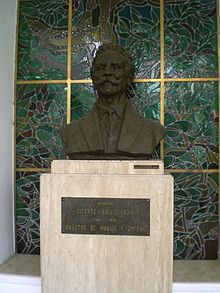Vicente Emilio Sojo
Vicente Emilio Sojo (born December 8, 1887 in Guatire / Miranda , † August 11, 1974 in Caracas ) was a Venezuelan composer.
Sojo had first studied with Henrique León and Régulo Rico , where he received an education in music theory, in treble, flute-, Trombones and guitar, before he came to Caracas in 1906 where 1910 he in the Escuela de Música y Declamación the Academia de Bellas Artes entered. There he studied music theory with Ignacio Bustamante and composition with Andrés Delgado Pardo . In 1912 he attended cello courses with Eduardo Richter . In 1914 he was Kapellmeister at the Church of San Francisco .
When Hilario Machado Guerra became director of the Escuela de Música in 1921, Sojo was given a position as professor of music theory. He worked as the conductor of the first important Colombian choir Orfeón Lamas and in 1930 founded the Orquesta Sinfónica Venezuela , whose director he became. Sojo introduced the classical guitar as an instrument in music studies around 1930 and was thus a pioneer for the inclusion of this instrument in the courses offered by European music conservatories. In 1936 he was appointed director of the Escuela Superior de Música José Ángel Lamas , whose first graduates finished their training in 1944. In 1940 he was co-editor of the first Venezuelan children's hymn book.
Sojo's students included Evencio Castellanos , Antonio Estévez , Angel Sauce , Antonio José Ramos , Inocente Carreño , Gonzalo Castellanos Yumar , Carlos Figueredo , Antonio Lauro , Blanca Estrella de Méscoli , José Clemente Laya , Manuel Ramos , Andrés Sandoval , José Luis Muñoz , Leopoldo Billings , José Antonio Abreu , Modesta Bor , Nazyl Báez Finol , Nelly Mele Lara , Raymundo Pereira and Rogelio Pereira .
Sojo was also politically active. He founded the Acción Democrática in 1941 and was elected Senator of the Republic in the state of Miranda in 1958 and 1963.
Works
- Himno a Bolívar , 1911
- Romanza sin palabras , 1912
- Meditación para quinteto de cuerdas , 1912
- Treno para cuarteto , 1912
- Minerva , 1912
- Cuarteto en Re para cuerdas , 1913
- Partitura para festiva , 1914
- Tres motetes para la iglesia Santa Capilla , 1914
- Misa Coral , 1915
- Salve Reina , 1918
- Obertura Treno , 1920
- Ave María , 1922
- Misa Cromática , 1923
- Ocho responsorias y un Te Deum , 1924
- Palabras de Cristo en el Calvario , 1925
- 27 canciones de ayer , 1926-1927
- Por la Cabra Rubia , 1928
- Requiem Inmemorian Patris Patriae , 1929
- Misa Breve , 1930-1933
- Misa a capella en honor a Santa Efigenia ya su fallecida esposa , 1935
- Tres canciones infantiles , 1939
- Tres piezas para guitarras , 1952
- Misa para Santa Cecilia , 1953
- 10 canciones infantiles venezolanas , 1958
- 9 Canciones Infantiles , 1964-1969
Individual evidence
- ↑ Wolf Moser : "In the tonal area a lot can still be created". Conversation with the Venezuelan composer Antonio Lauro. In: Guitar & Laute 3, 1981, 1, pp. 13-19; here: pp. 15–17.
| personal data | |
|---|---|
| SURNAME | Sojo, Vicente Emilio |
| BRIEF DESCRIPTION | Venezuelan composer |
| DATE OF BIRTH | December 8, 1887 |
| PLACE OF BIRTH | Guatire , Miranda, Venezuela |
| DATE OF DEATH | August 11, 1974 |
| Place of death | Caracas , Venezuela |
